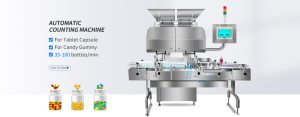Large Uptick in Speed of Production
One of the special features of automatic tablet press machine is that it can able to manufacture a huge number of tablets in very less time. Manual operations or old mechanical presses will produce a few thousand tablets per hour at best, but for automatic cams (as the Nouveau Design) it is not uncommon to churn out 100-s of thousands up to more than one million pieces an hour as well depending on machine size and configuration. This quick production is vital in order to respond promptly and efficiently to big pharma requirements.
Uniform Tablet- to-tablet Quality
In the pharmaceutical manufacturing industry, there is no latitude in terms of consistency; if a tablet weighs 500mg on average, it must conform exactly to this specification for an entire production run. Precision and filling dosing systems in automatic presses ensure that all tablets are equal. This is not only in line with strict health regulations, but also helps continue consumer confidence of pharmaceutical brands. The accuracy of automatic tablet presses means that there would be fewer defects or discrepancies in a batch, which could cause rejection/recall of the entire batch and mitigates product recall risks.
Reduction of Labor Costs
However, if companies automate the process of making these tablets it will reduce manual work force. Just one automatic tablet press machine can take the place of multiple manual stations, greatly minimizing extensive manpower. If proper automation is designed, then more than direct labour costs can be saved; indirect employee-related costs such as training and health and safety compliance may also decrease. Moreover, automation processes help decrease any human-made errors that tired-from-fatigue workers might take while operating them as well, hence improving overall operational safety and efficiency.

Enhanced Operational Control
New tablet presses come complete with cutting-edge control systems that serve to enable fast adjustment of machine parameters while providing the flexibility for operators to monitor performance in real time. They give feedback on the system to operators and detect problems at an early stage, preventing machine damage or downtime. This control means keeping uptime to a maximum, and making the production process as efficient as it can be with minimum interruptions.
The ability to scale and flexible in production
Automated press systems provide the ability to scale production capacities and tablet specifications without lengthy setup changeover times. This means they are capable of reacting quickly to changes in the market - such as if there is a demand spike for certain drugs or new products entering production. For businesses that are trying to scale up without having to consistently invest in new equipment, scalability is a huge factor.
Quality Assurance Systems Integration
It has been incorporated into the operation of automatic tablet presses by making them completely quality compliant. These machines can be interfaced with in-line quality control systems for weight, thickness and hardness checks. The production of certified quality tablets, in turn, prevents powerful post-production checks and possible waste due to discarded non-compliant tabCASIONETs.
The automatic tablet press machine has become one of the most important manufacturing technologies in contemporary pharmaceutical industry as it integrates efficiency,precision and innovation into a single product. This not only fuels the profitability of manufacturers by transforming raw materials into finished pharmaceutical products quickly, but it also plays a key role in delivering safe and effective healthcare to patients internationally. For any operation trying to stand out in the competitive world of pharmaceutical production, this technology is essential.